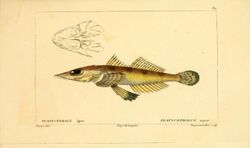Biology:Rogadius
| Rogadius | |
|---|---|

| |
| Rogadius asper syn. Platycephalus asper | |
| Scientific classification | |
| Domain: | Eukaryota |
| Kingdom: | Animalia |
| Phylum: | Chordata |
| Class: | Actinopterygii |
| Order: | Scorpaeniformes |
| Family: | Platycephalidae |
| Genus: | Rogadius D. S. Jordan & R. E. Richardson, 1908 |
| Type species | |
| Platycephalus asper | |
Rogadius is a genus of marine, demersal ray-finned fish belonging to the family Platycephalidae. These fishes are native to the Indian Ocean and the western Pacific Ocean.
Taxonomy
Rogadius was first formally proposed as a genus in 1908 by the American ichthyologists David Starr Jordan and Robert Earl Richardson with Platycephalus asper, which had been described in 1829 by Georges Cuvier from Nagasaki, designated as its type species.[1][2] This genus is classified within the family Playtcephalidae, the flatheads which the 5th edition of Fishes of the World classifies within the suborder Platycephaloidei in the order Scorpaeniformes.[3]
Etymology
Rogadius is a latinisation of rogad, an Arabic name for the bartail flathead (Platycephalus indicus).[4]
Species
Rogadius contains seven species:[5][6]
- Rogadius asper (Cuvier, 1829) (Olive-tailed flathead)
- Rogadius fehlmanni L. W. Knapp, 2012[6]
- Rogadius mcgroutheri Imamura, 2007 (McGrouther's flathead)
- Rogadius patriciae L. W. Knapp, 1987 (Black-banded flathead)
- Rogadius pristiger (Cuvier, 1829) (Thorny flathead)
- Rogadius serratus (Cuvier, 1829) (Serrated flathead)
- Rogadius welanderi (L. P. Schultz, 1966) (Welander's flathead)
Characteristics
Rogadius flatheads have two or more preopercular spines have at least 2 spines on the preoperculum, with the upper spine being the longest. There is no elongation of the upper lobe of the caudal fin with no elongated filament extending out from that fin. The first dorsal fin has between 8 or 9 spines. the second being equal in height to the third, while the second dorsal fin has no more than 12 soft rays. There are 2 separate patches of vomerine teeth. There are between 48 and 56 pored scales, each with 2 pores, on the lateral line with spines on the scales in the anterior portion of that line. The diagonal rows of scales run downwards and backwards over lateral line and the number of these rows is roughly about equal to the number of scales in the lateral line, typically with a difference of only 1 or 2 scales. The head has bony ridges which have many fine serrations on them, There uis a single bony ridge on the side of the head underneath the eye with the lower margin of the suborbital not being clearly visible due to being turned inward. The lappet on the iris has two lobes.[7] The maximum length attained by these fishes varies from a standard length of 11.2 cm (4.4 in) in R. fehlmanni to a maximum total length of 50 cm (20 in) in R. pristiger.[5]
Distribution
Rogadius flatheads are found in the Indian and Western Pacific Oceans from the Red Sea to Tonga,[8] north to southern Japan and south to Australia.[9]
References
- ↑ 1.0 1.1 Eschmeyer, William N.; Fricke, Ron; van der Laan, Richard, eds. "Genera in the family Platycephalidae". California Academy of Sciences. http://researcharchive.calacademy.org/research/ichthyology/catalog/fishcatget.asp?tbl=genus&family=Platycephalidae.
- ↑ Eschmeyer, William N.; Fricke, Ron; van der Laan, Richard, eds. "Species in the genus Rogadius". California Academy of Sciences. http://researcharchive.calacademy.org/research/ichthyology/catalog/fishcatget.asp?tbl=species&genus=Rogadius.
- ↑ J. S. Nelson; T. C. Grande; M. V. H. Wilson (2016). Fishes of the World (5th ed.). Wiley. pp. 467–495. ISBN 978-1-118-34233-6. https://sites.google.com/site/fotw5th/.
- ↑ Christopher Scharpf; Kenneth J. Lazara, eds (7 December 2021). "Order Perciformes (Part 11): Suborder Platycephaloidei: Families Bembridae, Parabembridae, Hoplichthyidae, Platycephalidae and Plectrogeniidae". The ETYFish Project Fish Name Etymology Database. Christopher Scharpf and Kenneth J. Lazara. https://etyfish.org/perciformes11/.
- ↑ 5.0 5.1 Froese, Rainer and Pauly, Daniel, eds. (2022). Species of Rogadius in FishBase. February 2022 version.
- ↑ 6.0 6.1 Knapp, L.W. (2012). "Rogadius fehlmanni, a new flathead fish (Scorpaeniformes: Platycephalidae) from Somalia". Proceedings of the Biological Society of Washington 125 (1): 61–65. doi:10.2988/11-20.1.
- ↑ L.W. Poss (1999). "Platycephalidae Flatheads". FAO species identification guide for fishery purposes. The living marine resources of the Western Central Pacific. Volume 4. Bony fishes part 2 (Mugilidae to Carangidae). FAO, Rome. pp. 2385–2421. ISBN 9251043019.
- ↑ Froese, Rainer and Pauly, Daniel, eds. (2022). "Rogadius pristiger" in FishBase. February 2022 version.
- ↑ Froese, Rainer and Pauly, Daniel, eds. (2022). "Rogadius asper" in FishBase. February 2022 version.
Wikidata ☰ Q2173712 entry
 |


